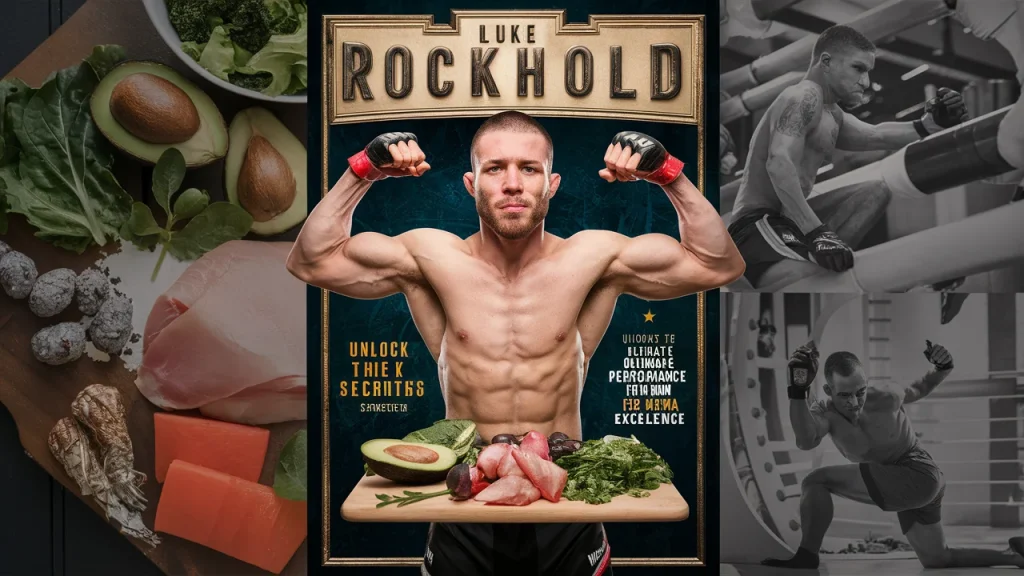Welcome to our comprehensive guide on Luke Rockhold’s diet and nutrition plan, designed to help MMA fighters reach their peak performance in the octagon. As a professional athlete, Luke Rockhold understands the vital role that proper nutrition plays in his training, recovery, and overall success. In this article, we will delve into the specifics of his diet, meal plan, and exercise regimen, providing valuable insights and tips for aspiring fighters.
Key Takeaways:
- Luke Rockhold’s diet and nutrition plan are crucial for optimizing performance in MMA.
- His meal plan focuses on nutrient-dense foods that support muscle growth and repair.
- Meal prep plays a significant role in ensuring consistent adherence to his dietary needs.
- Weight cutting techniques are utilized by MMA fighters like Luke Rockhold for specific competition requirements.
- A well-rounded fitness regimen complements Rockhold’s diet and enhances his overall athletic performance.
Luke Rockhold’s Meal Plan and Meal Prep
In this section, we will delve into Luke Rockhold’s specific meal plan and meal prep strategies. To maximize his performance in the MMA arena, Rockhold understands the importance of fueling his body with the right nutrients and maintaining a well-balanced diet.
Meal Plan
Rockhold’s meal plan focuses on providing him with the necessary energy and nutrients to support his intense training regimen. His diet consists of a variety of whole foods, including lean proteins, complex carbohydrates, healthy fats, and plenty of fruits and vegetables.
Proteins play a crucial role in Rockhold’s meal plan as they aid in muscle recovery, repair, and growth. He includes sources such as chicken, turkey, lean beef, and fish, ensuring he meets his daily protein requirements. Additionally, he incorporates plant-based protein sources like lentils, quinoa, and tofu to provide a well-rounded nutritional profile.
Complex carbohydrates form the backbone of Rockhold’s diet, providing him with sustained energy for his rigorous training sessions. He incorporates whole grains, sweet potatoes, brown rice, and oats into his meals to ensure he has enough fuel to power through his workouts.
Healthy fats are another essential component of Rockhold’s meal plan. He includes sources like avocados, nuts, seeds, and olive oil to provide his body with the necessary fats for hormone production, brain function, and overall health.
Fruits and vegetables are a staple in Rockhold’s diet, providing him with a wide range of vitamins, minerals, and antioxidants. He incorporates a variety of colorful produce into his meals to ensure he gets the necessary micronutrients to support his immune system and promote overall health.
Meal Prep
Proper meal preparation is key to staying on track with his nutrition and ensuring that he has healthy options readily available. Rockhold takes the time to plan his meals in advance, ensuring that he has balanced options for breakfast, lunch, dinner, and snacks.
He dedicates a specific day or time during the week to prepare his meals and snacks for the upcoming days. This allows him to have portioned and pre-portioned meals ready to grab whenever he needs them, whether he’s at home or training at the gym.
Rockhold focuses on preparing his meals with fresh, whole ingredients to maximize the nutritional value of his food. He opts for cooking methods like grilling, baking, or steaming to minimize the use of added fats and oils.
By planning and preparing his meals in advance, Rockhold ensures that he stays consistent with his nutrition, avoids unhealthy temptations, and optimizes his performance both inside and outside the octagon.
Weight Cutting Tips for MMA Fighters
Weight cutting is a crucial aspect of preparation for MMA fighters like Luke Rockhold. It involves reducing body weight in a short period before a fight to compete in a lower weight class or achieve a size advantage over opponents. However, weight cutting can be challenging and risky if not done correctly. Here are some valuable weight cutting tips that can help you safely and effectively cut weight while maintaining performance and health.
1. Start Early and Gradually
The key to a successful weight cut is to start early and gradually reduce weight over time. Trying to cut too much weight in a short period can lead to dehydration, muscle loss, and decreased performance. Begin your weight cut well in advance, ideally several weeks before the fight, which allows you to cut weight gradually while preserving your energy levels and muscle mass.
2. Optimize Your Nutrition
Nutrition plays a crucial role in weight cutting. Ensure that your diet consists of nutrient-dense foods to support your training and recovery while facilitating weight loss. Increase your intake of lean proteins, fruits, vegetables, and whole grains while limiting processed foods, sugary beverages, and excessive salt intake. A well-balanced diet will provide the necessary fuel for your workouts and help you shed excess weight.
3. Hydrate Properly
Hydration is essential for both performance and weight cutting. To optimize your weight cut, start by being adequately hydrated throughout your training camp. A few days before the weigh-in, gradually reduce your water intake to minimize water retention. On the day of the weigh-in, limit fluid intake, and only take small sips when necessary. Remember to consult with a nutritionist or sports dietitian to develop a safe and effective hydration plan tailored to your specific needs.
4. Use Saunas and Sweat Suits
Saunas and sweat suits can be effective tools for reducing water weight when used cautiously. However, excessive sweating can lead to dehydration and electrolyte imbalances, which can be dangerous. It is crucial to monitor your body’s response and be mindful of your limits. Always consult with your team’s medical personnel to ensure your safety and well-being while using these methods.
5. Seek Professional Guidance
Weight cutting is a complex process that requires careful planning and supervision. It is strongly recommended to seek the guidance of professionals such as nutritionists, strength and conditioning coaches, and medical experts who specialize in combat sports. They can provide personalized advice tailored to your body composition, training routine, and weight cutting goals.
6. Prioritize Recovery
After cutting weight, it is crucial to prioritize your recovery to replenish your body and ensure optimal performance on fight day. Focus on rehydrating, replenishing glycogen stores, and consuming nutrient-rich foods. Proper recovery will help restore energy levels and prepare your body for the physical demands of the fight.
“Weight cutting is a challenging process that requires both discipline and strategy. By following these weight cutting tips, you can safely shed those extra pounds while maintaining your performance and health inside the cage.”
| Weight Cutting Tips for MMA Fighters |
|---|
| Start Early and Gradually |
| Optimize Your Nutrition |
| Hydrate Properly |
| Use Saunas and Sweat Suits |
| Seek Professional Guidance |
| Prioritize Recovery |
Luke Rockhold’s Fitness Regimen
When it comes to maintaining peak performance in the brutal world of mixed martial arts (MMA), a well-rounded fitness program is essential. Luke Rockhold, a renowned MMA fighter, understands this better than anyone. His commitment to a rigorous fitness regimen sets him apart in the octagon, enabling him to dominate his opponents with both strength and agility.
Rockhold’s fitness regimen consists of a comprehensive training routine that incorporates various exercise modalities to enhance his overall athleticism and combat skills. Let’s take a closer look at the key components of his fitness program:
Training Routines
Rockhold’s training routines are carefully designed to improve his strength, endurance, and technique. He follows a structured schedule that includes both cardio and resistance training sessions. By combining these two elements, Rockhold builds the stamina and power necessary to outlast his opponents in the cage.
Exercise Selection
The exercise selection in Rockhold’s regimen is diverse and caters to the specific demands of MMA. His workouts include a combination of weightlifting, plyometrics, calisthenics, and functional training. By incorporating exercises that mimic the movements and intensity of a fight, Rockhold hones his skills and improves his overall athletic ability.
Conditioning Techniques
Conditioning is a crucial aspect of Rockhold’s fitness regimen, ensuring that he can endure the physical demands of an MMA bout. He employs a variety of techniques such as interval training, circuit training, and high-intensity interval training (HIIT) to improve his cardiovascular fitness and muscular endurance. These conditioning methods allow Rockhold to maintain a high level of performance throughout the duration of a fight.
Rockhold’s fitness regimen is a testament to the importance of comprehensive training for MMA fighters. By focusing not only on technique but also on strength, endurance, and conditioning, he elevates his game to the next level. This holistic approach to fitness sets him apart from his competitors and solidifies his status as a top contender in the MMA world.
| Key Components of Luke Rockhold’s Fitness Regimen |
|---|
| Training Routines |
| Exercise Selection |
| Conditioning Techniques |
Nutrition and Health Tips for Fighters
As an MMA fighter, your performance heavily relies on your physical health and nutrition. To ensure you’re at the top of your game, it’s essential to prioritize your overall well-being. Here are some valuable nutrition and health tips that can help you achieve peak performance in the octagon:
1. Hydration is Key
Staying properly hydrated is crucial for optimal performance and recovery. Make sure to drink plenty of water throughout the day and during training sessions. Dehydration can negatively impact your endurance, cognitive function, and overall performance.
2. Balance Your Macros
A well-balanced diet is essential to fuel your body and support muscle growth and repair. Aim to consume a combination of carbohydrates, proteins, and healthy fats in each meal. Carbohydrates provide energy, proteins aid in muscle repair, and healthy fats promote overall health and hormone balance.
| Nutrient | Food Sources |
|---|---|
| Carbohydrates | Quinoa, sweet potatoes, whole-grain bread |
| Proteins | Lean meats, poultry, fish, tofu |
| Healthy Fats | Avocado, nuts, seeds, olive oil |
3. Prioritize Post-Workout Recovery
After intense training sessions, your body needs time to recover and repair. Focus on consuming a post-workout meal or snack within 30-60 minutes of training to replenish glycogen stores and promote muscle recovery. Include a combination of carbohydrates and proteins for optimal results.
4. Don’t Overlook Micronutrients
While macronutrients are essential, micronutrients play a crucial role in supporting overall health and performance. Ensure you’re consuming a variety of fruits and vegetables to obtain important vitamins and minerals. Consider taking a high-quality multivitamin supplement to cover any potential gaps in your diet.
5. Listen to Your Body
Every fighter is different, and what works for one may not work for another. Pay attention to how your body responds to different foods and adjust your diet accordingly. Consulting with a registered dietician or nutritionist can provide personalized guidance tailored to your specific needs and goals.
“Nutrition is the foundation of your performance. Take care of your body, and it will take care of you in the cage.”
By following these nutrition and health tips, you can optimize your performance, enhance your recovery, and support your overall well-being as an MMA fighter. Remember, your diet is a vital component of your training regimen, and investing in proper nutrition will undoubtedly pay off in the long run.
The Role of Diet and Exercise in Luke Rockhold’s Success
When it comes to achieving success in the world of MMA, the importance of a well-rounded diet and exercise routine cannot be overstated. Luke Rockhold, a renowned MMA fighter, understands this better than anyone, as his exceptional performance inside the octagon can be attributed to his meticulous attention to nutrition and training. In this section, we will delve into the key factors that contribute to Rockhold’s success, including his diet and workout regimen.
Diet: Rockhold follows a comprehensive nutrition plan designed to fuel his body for optimal performance. His diet consists of a balance of macronutrients – proteins, carbohydrates, and fats – which provide the energy he needs during training and fights. By focusing on consuming whole, nutrient-dense foods, Rockhold ensures that he receives the necessary vitamins, minerals, and antioxidants to support his overall health and recovery.
To meet his protein requirements, Rockhold incorporates lean sources such as poultry, fish, and plant-based proteins like tofu and tempeh. These protein sources aid in muscle repair and growth, crucial for a fighter’s strength and power. He also includes complex carbohydrates like quinoa, sweet potatoes, and brown rice, which provide sustained energy and help replenish glycogen stores depleted during training sessions.
Workout: Rockhold’s workout regimen focuses on improving his strength, endurance, and agility, all of which are vital in the MMA world. He combines high-intensity interval training (HIIT) with strength training exercises to develop explosive power and cardiovascular conditioning.
Additionally, Rockhold incorporates sports-specific training drills and techniques to enhance his skills inside the octagon. This includes grappling, striking, and sparring sessions, which simulate real fight scenarios and help him refine his techniques and strategies.
By following a well-structured diet and exercise routine, Rockhold optimizes his physical performance and ensures he is always in peak condition. His dedication to nutrition and training has undoubtedly played a pivotal role in his success as an MMA fighter.
“Diet and exercise are the key foundations of any successful fighter’s training,” says Rockhold. “By nourishing your body with the right nutrients and consistently pushing yourself in the gym, you can unlock your full potential.”
Aspiring MMA fighters can learn from Rockhold’s approach to nutrition and training. By prioritizing a well-balanced diet and incorporating a variety of workouts that target different aspects of physical fitness, fighters can maximize their potential and achieve their own successes inside the octagon.
Conclusion
In conclusion, a well-balanced diet and proper nutrition play a crucial role in an athlete’s performance and overall health. As we have seen through Luke Rockhold’s dietary choices and planning, a professional athlete meal plan tailored to specific needs and goals is essential for peak performance.
Healthy eating for athletes goes beyond just consuming enough calories. It involves selecting nutrient-dense foods that support muscle recovery, energy levels, and immune function. By prioritizing whole foods, including lean proteins, complex carbohydrates, and healthy fats, athletes can fuel their bodies effectively and optimize their performance.
Furthermore, an increasing number of athletes, like Luke Rockhold, are turning to plant-based diets for their numerous benefits. A plant-based diet for athletes provides ample nutrients, antioxidants, and fiber while reducing the intake of potentially harmful components such as saturated fats and artificial additives. Consider incorporating more plant-based options into your meal plan to enhance your overall well-being and support optimal athletic performance.
FAQ
What does Luke Rockhold’s diet consist of?
Luke Rockhold’s diet consists of lean proteins, healthy fats, complex carbohydrates, and a variety of fruits and vegetables. He focuses on clean, whole foods to fuel his training and recovery.
How does Luke Rockhold plan and prepare his meals?
Luke Rockhold believes in the importance of meal preparation. He plans his meals in advance, ensuring they align with his nutritional needs and training schedule. He prioritizes fresh ingredients and cooks his meals at home whenever possible.
What are some weight cutting tips for MMA fighters?
Weight cutting can be challenging and potentially harmful if not done correctly. Luke Rockhold suggests working with a professional nutritionist or dietitian who specializes in combat sports to create a safe and effective weight-cutting plan. It’s important to gradually reduce calorie intake and increase water intake while monitoring hydration levels closely.
What does Luke Rockhold’s fitness regimen consist of?
Luke Rockhold’s fitness regimen includes a combination of strength training, cardiovascular exercises, and specific MMA training techniques. He incorporates exercises such as weightlifting, cardio intervals, stretching, and high-intensity interval training (HIIT) to improve his strength, endurance, and overall performance.
What are some nutrition and health tips for fighters?
Luke Rockhold emphasizes the importance of staying hydrated, fueling the body with the right nutrients, and prioritizing recovery. Hydration is crucial to maintain performance and prevent dehydration. He also suggests incorporating supplements like protein powders, branch chain amino acids (BCAAs), and omega-3 fatty acids into the diet to support muscle repair and overall health.
How does Luke Rockhold’s diet and exercise routine contribute to his success?
Luke Rockhold’s diet and exercise routines play a significant role in his success as an MMA fighter. His nutrition choices provide the necessary fuel for intense training sessions and aid in muscle recovery. Combined with his tailored fitness regimen, these practices help optimize his performance, strength, and endurance inside the octagon.
What is the importance of a well-balanced diet and nutrition for athletes?
A well-balanced diet and proper nutrition are vital for athletes to fuel their training, support muscle repair and growth, and maintain overall health. The right nutrients can optimize performance, reduce the risk of injuries, and enhance recovery. Good nutrition is key to achieving peak athleticism and long-term success.
Is Luke Rockhold’s diet plant-based?
While Luke Rockhold focuses on incorporating lean meats into his diet to meet his protein needs, he also recognizes the benefits of a plant-based diet for athletes. He believes plant-based meals can provide excellent nutritional value and supports athletes who choose to follow this dietary approach.











